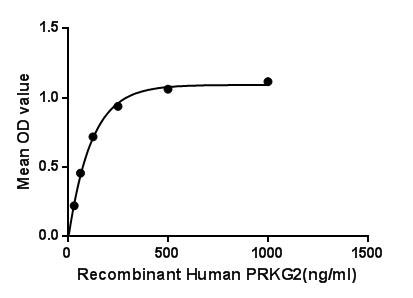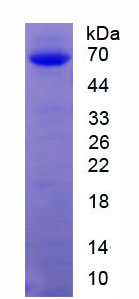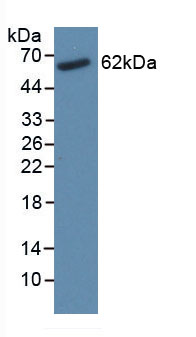Active Protein Kinase, cGMP Dependent Type II (PRKG2) 

PRKGR2; cGKII; cGMP-dependent protein kinase 2
- UOM
- FOB US$ 360.00 US$ 900.00 US$ 1,800.00 US$ 5,400.00 US$ 13,500.00
- Quantity
Overview
Properties
- Product No.APH313Hu01
- Organism SpeciesHomo sapiens (Human) Same name, Different species.
- ApplicationsCell culture; Activity Assays.
Research use only - DownloadInstruction Manual
- CategoryEnzyme & Kinase
- Buffer Formulation20mM Tris, 150mM NaCl, pH8.0, containing 1mM EDTA, 1mM DTT, 0.01% SKL, 5% Trehalose and Proclin300.
- Traits Freeze-dried powder, Purity > 90%
- Isoelectric Point8.9
Sign into your account
Share a new citation as an author
Upload your experimental result
Review

Contact us
Please fill in the blank.
Activity test

Figure. The binding activity of PRKG2 with HSP90aA1.
Protein Kinase, cGMP Dependent Type II (PRKG2) belong to cGMP-dependent protein kinase or Protein Kinase G (PKG) which is a serine/threonine-specific protein kinase that is activated by cGMP. Two PKG genes, coding for PKG type I (PKG-I) and type II (PKG-II), have been identified in mammals. The PKG-I and PKG-II are homodimers of two identical subunits (~75kDa and ~85kDa, respectively) and share common structural features. PKG phosphorylates a number of biologically important targets and is implicated in the regulation of smooth muscle relaxation, platelet function, sperm metabolism, cell division, and nucleic acid synthesis. Besides, Heat Shock Protein 90kDa Alpha A1 (HSP90aA1) has been identified as an interactor of PRKG2, thus a binding ELISA assay was conducted to detect the interaction of recombinant human PRKG2 and recombinant human HSP90aA1. Briefly, PRKG2 were diluted serially in PBS, with 0.01% BSA (pH 7.4). Duplicate samples of 100µL were then transferred to HSP90aA1-coated microtiter wells and incubated for 2h at 37℃. Wells were washed with PBST and incubated for 1h with anti-PRKG2 pAb, then aspirated and washed 3 times. After incubation with HRP labelled secondary antibody, wells were aspirated and washed 3 times. With the addition of substrate solution, wells were incubated 15-25 minutes at 37℃. Finally, add 50µL stop solution to the wells and read at 450nm immediately. The binding activity of PRKG2 and HSP90aA1 was shown in Figure 1, and this effect was in a dose dependent manner.
Usage
Reconstitute in 20mM Tris, 150mM NaCl (pH8.0) to a concentration of 0.1-1.0 mg/mL. Do not vortex.
Storage
Avoid repeated freeze/thaw cycles. Store at 2-8°C for one month. Aliquot and store at -80°C for 12 months.
Stability
The thermal stability is described by the loss rate. The loss rate was determined by accelerated thermal degradation test, that is, incubate the protein at 37°C for 48h, and no obvious degradation and precipitation were observed. The loss rate is less than 5% within the expiration date under appropriate storage condition.
Increment services
-
 BCA Protein Quantification Kit
BCA Protein Quantification Kit
-
 Molecular Mass Marker for Protein
Molecular Mass Marker for Protein
-
 Monoclonal Antibody Customized Service
Monoclonal Antibody Customized Service
-
 Polyclonal Antibody Customized Service
Polyclonal Antibody Customized Service
-
 Protein Activity Test Experiment Service
Protein Activity Test Experiment Service
-
 Electrophoretic Mobility Shift Assay (EMSA) Experiment Service
Electrophoretic Mobility Shift Assay (EMSA) Experiment Service
-
 Buffer
Buffer
-
 Lentivirus Packaging Experiment Service
Lentivirus Packaging Experiment Service
-
 Adenovirus Packaging Experiment Service
Adenovirus Packaging Experiment Service
-
 Real Time PCR Experimental Service
Real Time PCR Experimental Service
-
 Spike RBD Protein (S-RBD)
Spike RBD Protein (S-RBD)
-
 Protein G
Protein G
-
 Protein A
Protein A
Citations
- Enhanced heart failure, mortality and renin activation in female mice with experimental dilated cardiomyopathypubmed:29240788








